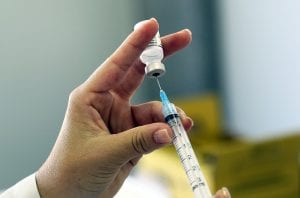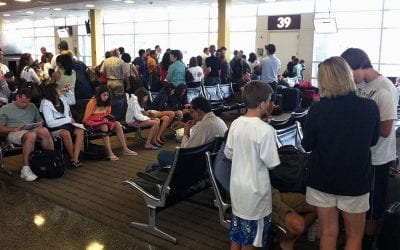With more than 14 million Americans fully vaccinated, many are asking if it’s safe for them to travel and stop wearing face masks. We need to ask ourselves if we know enough about COVID-19 and its vaccines to make that decision.

To decide if fully vaccinated Americans can safety travel and if vaccinated individuals must continue to wear face masks, we need to learn more about the COVID-19 vaccines and their capability.
There are three basic vaccination realities that can potentially produce:
1. Stop you from getting the virus entirely.
2. Stop the transmission of the virus from you to others.
3. Stop you from having the symptoms of the virus, if you contract it.
What vaccination reality do the studies of the Pfizer and Moderna vaccines provide?
The U.S. has approved two vaccines at this time: Pfizer and Moderna Therapeutics. How well can these vaccines stop those vaccinated from getting COVID-19? Do the vaccines produce “sterilizing immunity” or do they allow asymptomatic infections that our bodies can fight off?
The studies performed by Pfizer and Moderna tested for human safety and whether the vaccines could prevent people who contracted the virus from getting symptomatic COVID-19 or die. The thrust of the study was not to ascertain if the vaccines produced “sterilizing immunity.”
The vaccination reality test results of the Pfizer and Moderna vaccines were outstanding.
Exactly how efficacious are the Pfizer and Moderna vaccines?
It takes about two weeks after the second dose of both the Pfizer and Moderna vaccines for them to take full effect. At that point, the Moderna vaccine data showed it was 99.92 percent effective in preventing symptomatic COVID-19 infection. The control side of the study saw 3.5 percent of participants contract symptomatic COVID-19. The Pfizer vaccine test data showed its vaccine was 99.95 percent effective in preventing symptomatic COVID-19. These tests were based on the original COVID-19 virus.
READ ALSO:
Is rapid virus testing as good as a vaccine for control?
Double masking coming for safety against COVID variants?
Mandatory mask orders
What don’t the studies of the Pfizer and Moderna vaccines tell us?
On the other hand, at this time we don’t have data from the drug company studies measuring the effect the vaccines had, if any, on preventing the transmission of the virus. Therefore, we don’t know how well the vaccines currently being administered in the U.S. prevent COVID-19 transmission. We do know that they don’t stop everyone from getting the virus entirely.
Even without having this additional data at this time, we can infer that the vaccines will lead to fewer Americans with a serious COVID-19 illness or dying from the virus.
Are their potential problems that the Pfizer and Moderna vaccine tests don’t address?

First, each person is an individual with different bodies and underlying conditions and factors. The level of immunity for each person vaccinated will vary. Some individuals will have less immunity than others. We don’t know how long immunity lasts or when and if immunity begins to wane, and how quickly. A traveler’s destination can also affect COVID-19 safety. If you’re traveling to see a family member in a large hospital, it’s likely you decrease your safety while there, even if vaccinated.
Finally. we have the COVID mutation caveat. There are multiple COVID-19 variants circling the globe today. More are likely to emerge over time. In existence. today are the Brazil variant (B11248), the United Kingdom variant (B117). and the South Africa variant (B1351). Each has been detected in the U.S. Just this month, a new variant has been in the news. It’s the southern California variant (CAL.20C). We don’t yet know the efficacy of the existing vaccines in fighting the COVID-19 variants. We don’t know if they have the same potency for stopping symptomatic COVID-19 infections, reducing transmission of the virus or stopping it altogether.
For fully vaccinated travelers, what’s the main problem in deciding if travel is safe and face masks still must be worn?
With all the information we have about COVID-19 and its vaccines, the main problem in deciding if fully vaccinated Americans can safely travel now and possibly stop wearing masks, perhaps even when not solely in the presence of other fully vaccinated people, is that there is still too much we don’t know.
As much as anything, considerable testing needs to be completed about the efficacy of the vaccines on COVID-19 variants. It’s possible we may need vaccine boosters for those already vaccinated to prevent symptomatic infection of those individuals.
I think we can safely state that for those Americans who must travel if they are fully vaccinated for at least two weeks, it’s safer to travel today than before they were vaccinated.
While travel is likely safer for fully vaccinated individuals, the conclusion is that travel still has serious dangers from COVID-19 and masks must still be worn.
On the other hand, with the COVID-19 variants occurring around the globe, including in the U.S., and with COVID-19 hot spots still in existence, we can’t make any definitive statements that it’s safe for vaccinated individuals to travel. Especially with less than five percent of Americans vaccinated, for example, I recommend that even vaccinated individuals be extremely circumspect about travel anywhere, especially to hot spots at which COVID-19 variants have been detected. Only essential travel should be taken on at this time and every possible precaution should be taken.
Finally, as discussed in my recent article, “Double masking coming for safety against COVID variants?,” it’s clear that it’s premature to stop wearing face masks to prevent ourselves from becoming infected with COVID-19 or infecting others, especially since it’s possible we may be asymptomatically infected, even if fully vaccinated.
After many years working in corporate America as a chemical engineer, executive and eventually CFO of a multinational manufacturer, Ned founded a tech consulting company and later restarted NSL Photography, his photography business. Before entering the corporate world, Ned worked as a Public Health Engineer for the Philadelphia Department of Public Health. As a well known corporate, travel and wildlife photographer, Ned travels the world writing about travel and photography, as well as running photography workshops, seminars and photowalks. Visit Ned’s Photography Blog and Galleries.



